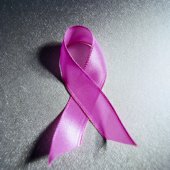- Could Your Grocery Store Meat Be Causing Recurring UTIs?
- Are You Making This Expensive Thermostat Error This Winter?
- Recognizing the Signs of Hypothyroidism
- 10 Strategies to Overcome Insomnia
- Could Artificial Sweeteners Be Aging the Brain Faster?
- Techniques for Soothing Your Nervous System
- Does the Water in Your House Smell Funny? Here’s Why
- Can a Daily Dose of Apple Cider Vinegar Actually Aid Weight Loss?
- 6 Health Beverages That Can Actually Spike Your Blood Sugar
- Treatment Options for Social Anxiety Disorder
Breast Cancer Chemo Tied to Small But Significant Leukemia Risk


Among early stage breast cancer patients who undergo chemotherapy and/or radiation treatment, less than half of one percent will eventually develop leukemia as a result of their treatment, a new analysis reveals.
The finding comes from a review of more than 20,000 breast cancer cases treated between 1998 and 2007, and it suggests that the risk for developing treatment-related leukemia, though low, is still double what experts had previously thought.
“The frequency of bone marrow cancers such as leukemia is small, there’s no question about it,” study lead author Dr. Judith Karp, professor emerita of oncology at the Johns Hopkins University School of Medicine in Baltimore, noted in a university news release.
“However, the cumulative risk over a decade is now shown to be twice as high as we thought it was, and that risk doesn’t seem to slow down five years after treatment,” she said.
Patients included in the review had been treated at eight different cancer centers across the United States, and information on their post-treatment health came from the National Comprehensive Cancer Network (NCCN).
The records showed that 50 patients developed leukemia within a decade following exposure to breast cancer chemotherapy, radiation, or both.
That translates into 0.50 percent of all treated patients — a figure that is twice the rate of 0.25 percent of patients seen in prior studies. According to Karp’s team, those earlier studies were based on much smaller groups of patients — usually just a few hundred people.
Reporting in the Dec. 22 issue of the Journal of Clinical Oncology, the researchers said the findings should give pause to doctors and breast cancer patients who are considering post-surgical treatment options.
At issue is whether or not patients with a very low risk for breast cancer recurrence always need “just-in-case” chemotherapy or radiation, given that the risk for leukemia may be greater than previously assumed.
For example, stage 1 breast cancer patients with very small localized tumors that have not spread to the lymph nodes may not want to incur any degree of added leukemia risk, when the potential benefit of post-surgery treatment might be negligible.
In addition, the NCCN no longer recommends that post-operative chemotherapy be standard for all stage 1 patients, Karp’s team noted in the news release.
While the study found an association between post-surgery chemotherapy or radiation and the risk of developing leukemia later, it did not prove a cause-and-effect relationship.
And two breast cancer experts not linked to the study said that post-operative treatments may still be worth it for many patients.
“Although the risk for leukemia is about double [than previously thought], it is very, very small and it is far outweighed by the absolute benefits in terms of decreasing the risk of developing new breast cancer tumors and breast cancer deaths,” said Dr. Charles Shapiro, co-director of the Dubin Breast Cancer Center at The Mount Sinai Hospital in New York City.
Dr. Stephanie Bernik is chief of surgical oncology at Lenox Hill Hospital in New York City. She said that, despite the small risk for leukemia seen in the study, “it is still important to remember that chemotherapy for breast cancer has improved overall survival when used appropriately.”
Bernik added: “Fortunately, we are moving into an era when chemotherapy is given more selectively, and to women that will have more of a benefit than in the past. Knowing this, women will need to make choices regarding their treatment. The risks and benefits need to be discussed with the medical oncologist to ensure that treatment is being optimized.”
More information
For more on breast cancer chemotherapy, visit the American Cancer Society.
Source: HealthDay
Copyright © 2026 HealthDay. All rights reserved.










